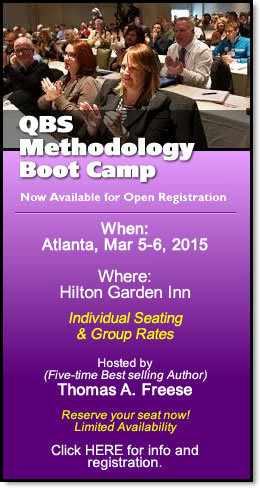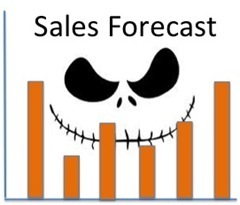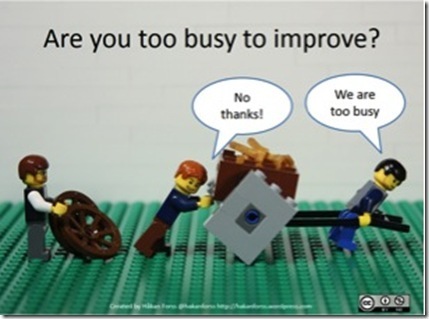Thomas A. Freese's Blog, page 10
June 9, 2015
The Lost Art of Closing Sales
Most top performers in sales are good closers. But, instead of just focusing on “doing deals,” effective closers are keenly aware that they must be continuously securing smaller commitments on the way to consummating the larger transaction.
Closing ‘deals’ in sales is ‘easy’ if the customer has an immanent need, they recognize the value of your product or service, you’ve successfully differentiated your offering, and the customer believes that the return on investment far exceeds the cost. What’s not to like? At that point, all the salesperson has to do is place an order form in front of the customer and say, “Press hard, five copies.”
I talked at length about closing strategies in my first book, Secrets of Question Based Selling. This ‘final’ phase of the sales cycle should be somewhat anticlimactic, in the sense that if a customer is indeed ‘ready’ to buy, then you don’t need a magic formula or clever one-liner to wrap up the transaction. But, when the customer is not ready, that’s when an effective closing strategy can be the difference maker.
Because buyers have become increasingly skeptical toward vendors, it’s only natural that they often hesitate before pulling the trigger at the end of the sales cycle. This trepidation shouldn’t surprise anyone. Given that most customers have previously made decisions they later regret, one of the buyer’s main concerns is avoiding another bad decision or picking the wrong solution. This is the new reality that unfortunately backdrops most sales opportunities.
That’s why I teach sellers to rely on logic when closing sales, rather than anything that might seem like pleading, or hoping to ‘coax’ the customer into buying? To understand how to maximize your probability of success when closing sales opportunities, it might helpful to first understand the fallacy of older-school approaches. For example, here’s an example that you might relate to…of what not to do:
Salesperson: “Mr. Customer, what do you say we go ahead and sign the paperwork and put you behind the wheel of this beauty?”
If you were the buyer, what’s the first thought that would pop into your head upon hearing these words? For me, I’m thinking that the salesperson just turned up the pressure, and wants to close the deal right here and now. But, why should I care what the salesperson wants? I’m the one who’s going to have to live with the decision. Another popular closing question goes something like, “Ms. Customer, what will it take for us to do business today?” This salesperson is clearly trying to turn verbal screws to press the customer that it’s time to ‘put up or shut up.’
There are few times in the QBS Methodology where I recommend exact wording, as the context and circumstances that apply in one sales opportunity may be very different than the next. But there are times where specific word-smithing and precision can help a lot. How to secure commitments needed to close more sales sooner is one of those times.
I wouldn’t call it a ‘surefire’ closing technique, but the most productive closing question I know taps into the customer’s motivations to act as opposed to sounding beggish or desperate. In the scenario where you are nearing the end of the decision cycle, and you think the customer is ready to be closed, I would ask the following:
Salesperson: “Ms. Customer, would it make sense to move forward with a purchase, so you start reaping the benefits of our solutions?”
If it wasn’t obvious, I specifically asked if it “would makes sense” to move forward with a purchase. The underlying strategy here is actually pretty simple. If it doesn’t “make sense” to move forward, they will respond by saying, “No,” and then it’s pretty easy to ask more questions to find out where the opportunity really stands. On the other hand, if it does make sense to move forward, you’ve made it pretty easy for the customer to say, “Sure, let’s do it.” Either way, you now where you stand relative the opportunity, as opposed to posing a ‘do or die’ closing question where you feel like you’re just putting your head on the proverbial block and hoping it doesn’t get chopped off.
Asking if it “would make sense to…” move forward is just as viable early in the sales process as it is when you’re trying to wrap up the transaction. For example, on the initial call, if you’re able to pique the customer’s curiosity, and establish enough credibility where they might want to further explore how your solutions might align with their needs, then all you have to do is ask the following:
Salesperson: “Mr. Customer, would it make sense to get the appropriate people together to further explore your options, how they might impact your business, and review the associated costs?”
The significance of this technique is sometimes lost in its subtlety. Asking customers if it “makes sense” to do anything introduces logic into the equation, where you’re basically inquiring as to their thoughts relative to taking the next step in the decision process, which sidesteps any perception that you’re trying to nail down a commitment to benefit your own pocketbook.
As an added bonus, if the customer does agree to take the next step and get “the appropriate people together,” there’s a good chance that your suggestion of involving other key players in the conference call, Web-x, or meeting, could significantly shorten your sales cycles.
April 16, 2015
What if the Customer’s First Impression is Wrong?
Would you agree that in sales, first impressions are important? It turns out that second impressions are important, too…as are third and fourth impressions, and so on. But, how can you be successful if the customer’s first impression of your product or service doesn’t reflect that actual value of your offering?
Suppose you work for a company like IBM. A small business owner could write you off by assuming they’re not big enough to deal with a tech giant like IBM. Or, in healthcare sales, a healthcare professional could easily assume a certain drug or medical device isn’t viable for their patients solely based on a comment made by one of his or her doctor buddies while playing golf.
In competitive industries, most prospects have already formed an impression about what your product or service does, and whether or not it might be valuable for them. In some cases, they’re intuitions are 100% correct. In other cases, they couldn’t be more off base. That’s why personal interaction with a salesperson, and more importantly—education, is the fulcrum that will make or break your success in developing new business opportunities moving forward.
To cite a specific example, let’s look at what I sell—QBS Methodology Training and consulting services. By the time I get on a conference call with a sales manager or exec, the majority of the time, they have already formed the impression that Question Based Selling is probably a class about asking questions, and that it’s only relevant for salespeople. Nope! Wrong! Hit the buzzer, #@$%&^*!!!
Obviously, telling decision makers they’re utterly and completely wrong is a dicey proposition. But at some point, if the customer’s impression of your value isn’t obvious, then it’s incumbent on you to change their perception by re-positioning and educating them on the true value of your offering.
On a QBS conference call, for example, I usually open by making the point that Question Based Selling is NOT about asking questions. And yes, I emphasize the word “not.” In most cases, this instantly shatters the decision maker’s perception of QBS and causes them to wonder, “If QBS is not about asking questions, then why is it called Question Based Selling?” Perfect! Causing potential clients to ask for a more in-depth explanation and perspective about my product or service is exactly what I want, and it’s what you should want as well.
While it’s true that there will be an opportunity for discovery in most sales calls, and what you ask and “how” you ask it, will indeed be important in terms of causing potential buyers to “want to” share information, needs development is just one small facet of successfully executing a much larger sales process. So, if we pull the curtains back a bit further, it turns out that the skills we teach in the QBS methodology are actually more about causing customers to form questions in their own mind about the value of your product or service. Hence, my desire to be ‘question-based.’
Think about it this way. When a potential customer starts to wonder, “How can you help us?” Or, “How is Question Based Selling different from traditional sales approaches?” Or, “How much does it cost?” Each and every one of these thoughts further increases the client’s curiosity—which is the mechanism that generates an even greater desire on their part to engage further. Bingo!
I then go on to suggest that instead of thinking of me as a sales trainer, it would be more accurate to think of me as an “un-trainer.” Again, the first thought that pops into a sales manager’s head is, “What do you mean by “un-trainer?” Bam! This is not some kind of trick. From there, I’m more than happy to explain that I spend much of my time “unwinding” flawed sales logic that may have been useful 30+ years ago, but no longer makes sense in today’s selling environment. And when I hit a few nerves and indict some of the mantras that have been chanted at sales meetings over the last several years, it then becomes easy to differentiate Question Based Selling as a methodology for engaging more customers in more productive conversation, as opposed to a class that only talks about how to ask a bunch of qualifying questions.
So, some of the more thought-inducing questions you might want to start asking yourself or your sales team include:
- What are you doing to leverage curiosity to get a 70 – 90% response rate when reaching out to customers via email or voice-mail?
- What are you doing to enhance your credibility besides just using the same buzzwords all your competitors use?
- What’s your strategy for causing potential customer’s to “want to” share information with a salesperson they don’t yet know or trust?
- Is your current messaging commoditizing your value or differentiating you from the rest of the ‘noise’ in the marketplace?
The answers to these and a host of other sales strategy questions will likely determine your success in terms of developing and closing new business opportunities in the future. Additionally, I also make the point that Question Based Selling is NOT just for salespeople. I wish I had a nickel for every time the hiring manager came up to me at the first break during a QBS training and said, “You know who should have been here—our marketing team, sales support, customer service reps, and our executive team.” Yep, that’s why I suggested it during our preparatory conference calls.
Causing prospective customers to alter and enhance their initial impressions of your value is oftentimes the difference between winning the business and coming in a close second.
BTW, how much do you get paid for coming in second place?
December 4, 2014
2016 QBS Winter Boot Camp: January 7 – 8
 “There has never been a better time for sellers to do everything possible to make themselves invaluable to their customers, colleagues, and their company.” -T. Freese
“There has never been a better time for sellers to do everything possible to make themselves invaluable to their customers, colleagues, and their company.” -T. Freese
We are excited to announce the upcoming 2016 QBS Winter Boot Camp! If you would like to renew your focus on increasing your own sales effectiveness, or give your entire sales team an unfair advantage over the competition, join us on January 7 – 8, 2016.
The program will be facilitated by five-time best-selling author Tom Freese.
The learning environment will be highly interactive, with participants from a variety of industries including technology, financial services, healthcare, consulting, insurance, real estate, manufacturing, advertising, hospitality, and retail, and feedback from previous QBS Summit events has been “off the charts.”
With limited seating, reserve your seats early since we are expecting a full house. You might also want to bring extra pencils and a stack of writing pads for note taking.
“Tom! I wanted to thank you for an amazing training two weeks ago-my head is still spinning from all of the great info. I met with our Regional Manager yesterday and he wants you to train the rest of our team. You will be hearing from us very soon…” -Liz B., Michigan…your newest QBS groupie!
2015 QBS Winter Boot Camp: March 5-6
 “There has never been a better time for sellers to do everything possible to make themselves invaluable to their customers, colleagues, and their company.” -T. Freese
“There has never been a better time for sellers to do everything possible to make themselves invaluable to their customers, colleagues, and their company.” -T. Freese
We’re very happy to announce our 2015 QBS Winter Boot Camp! If you would like to renew your focus on increasing your own sales effectiveness, or give your entire sales team an unfair advantage over the competition, join us on March 5 – 6, 2015.
The program will be facilitated by five-time best-selling author Tom Freese.
The learning environment will be highly interactive, with participants from a variety of industries including technology, financial services, healthcare, consulting, insurance, real estate, manufacturing, advertising, hospitality, and retail, and feedback from previous QBS Summit events has been “off the charts.”
With limited seating, reserve your seats early since we are expecting a full house. You might also want to bring extra pencils and a stack of writing pads for note taking.
“Tom! I wanted to thank you for an amazing training two weeks ago-my head is still spinning from all of the great info. I met with our Regional Manager yesterday and he wants you to train the rest of our team. You will be hearing from us very soon…” -Liz B., Michigan…your newest QBS groupie!
The Real Salesperson on the Account is NOT You!
Have you ever noticed that after all the steps in your sales process have been completed, the client then goes behind closed doors, with their boss and whoever else needs to sign-off on a purchase, and you’re typically not in that meeting? It’s how most big decisions are handled. Afterwards, you get a call from your contact in the account to let you know whether you won or lost.
Truth be known, in order for you to win the sale, someone in that closed door meeting (presumably your champion) must be willing to carry your flag up the hill, and make a compelling argument as to why they should select your solution over other competing alternatives. 
That person, who is willing to carry your flag when you’re not present, is the “real” salesperson on the account. And, if they are indeed confident enough to make a compelling case that favors your solution, then your probability of success can soar. However, if they are not able to garner the support of other parties when it comes time to make a decision, then your chances of making a sale are greatly diminished.
So, here’s a question all sellers should ponder: How many sales training courses do you think the typical “champions” in your accounts have attended in their career? The answer in most cases is none. And, since I’ve made the point that sales is the “least taught profession in the world,” it’s not only possible (but likely) that your success lies in the hands of someone who is totally unskilled at conveying your value proposition, and quite possibly, unprepared to make a compelling argument (to their boss or peers) that favors your offering.
Oops, that giant sucking sound is all your hard work going down the drain.
Therein lies the secret to excelling in sales—you create an extended sales force of people (internal champions, industry partners, etc.) who can carry the ball down the field when you’re either not on-site, or not directly involved in the final decision. Be aware that this is not something you have to force on customers. Most advocates of your product or service absolutely want to be seen as knowledgeable and well prepared when presenting a product or service to their boss and/or peers. As sellers, we simply must invest the time and effort to help them do just that. And fortunately for us, this type of investment usually pays big dividends.
As you strive to wrap deals up prior to the end of 2014, or you are working on deals that will close at some point down the road, ask yourself: What am I doing to cause the contacts I have within prospect accounts to be better salespeople? If I’ve seen it once, I have seen it hundreds of times, where the seller’s fate lies in the hands of someone who does not have the ability to convey value in a compelling manner and the net effect is you end up losing the business.
Some people might argue that teaching customers how to “sell” your products and services internally requires extra time. My experience has been just the opposite. When I invested the time to make my internal champions more effective advocates, it usually sped up the sales process, and also helped to ensure a successful implementation. What’s not to like about that?
The fix is a relatively easy one. Instead of focusing on selling your product, put yourself in the mode of empowering potential buyers to become better carriers of your messages. Said differently, stop being a salesperson and become a part-time sales trainer. It’s simple. Just start by asking, “Mr. Customer, would you be open to a couple of tips that other clients have used to get this purchase approved, or would you rather I back off and let you handle it?”
If you have any kind of relationship with the customer, they will almost certainly respond by saying, “Sure, I’d love some tips.” At that point, what they are really saying is, “Anything you can do to make me look good in front of my boss or the rest of the decision committee would be very much appreciated.” Bingo!
From there, go ahead and pull back the curtain and educate them on concepts like, The Herd Theory™, or about they can expand your value proposition using Gold Medals and German Shepherds™. You might want to introduce them to The Conversational Layering Model™, Conversational Dynamics™, or Mismatching™. Believe me when I tell you that your internal champions are just as hungry for effective methods that will successfully convey more value as you are. And, if you are indeed successful at making your internal advocates better conveyors of your message, everybody wins!
Call me if you want to strategize further…
November 28, 2014
Coaching New Sales Reps:
Quotable Quote: “It’s easier to file down the claws of a tiger than to teach a sheep to attack.”
November 20, 2014
Sales: The Least Taught Profession in the World
As I was preparing to work with a new client–one of the many who has recently adopted The Challenger Sale concepts–I spotted an article in last week’s Sunday paper called "Building a Better Teacher." Since one of the main tenants of The Challenger Sale is to Teach, Tailor, and Take Control, I read it with interest. There was one passage in particular that got my attention. The passage simply read:
"The natural born teacher has proven to be a myth. Those studies looking for the personality traits of a great teacher don’t pan out. Researchers have found that the most effective teachers can be extraverts–or they can just as easily be introverts. Some are humorous, but others are serious. Some are as flexible as rubber, and others are as rigid as a ruler. It’s not personality that makes a teacher great, but a specialized body of knowledge that must be learned–and that often goes against what comes naturally."
From my perspective, that same conclusion can be applied to sales. There are very few naturally born salespeople. Success in selling is a function of having the skills necessary to cause prospects to "want to" engage with you, as opposed to the countless other sales callers, coupled with the ability to earn credibility, convey value, create a sense of urgency, qualify, secure commitments, etc. Other than attending a few seminars and whatever experiences you’ve had, how are people who are given the responsibility of producing revenue supposed to learn how to sell?
If we dig deeper, we quickly discover that sales is the least taught profession in the world. To become a practicing attorney, for example, you must first pass the Bar exam. To become a licensed pharmacist, you must pass the boards in the state in which you wish to practice. Accountants, doctors, architects, and professional engineers all must pass some kind of competency test in order to call themselves a professional. Even kindergarten teachers must complete their master’s degree within ten years to continue in their jobs.
What do you have to do to become a sales professional? The answer is: print business cards. In the state where I live (Georgia), you have to have a license to catch a fish or own a dog, but you can sell nuclear parts without any sales training whatsoever. Something about that doesn’t seem right.
And just this past May, when our oldest daughter graduated from the University of South Carolina, as we sat in the stands waiting for her name to be called, it occurred to me that all of those kids wearing caps and gowns (or their parents) have invested $100K+ to get an education and presumably a head start into their chosen careers, yet the very first thing they will have to do right out of school is to sell–themselves. And the kicker is, after 17 years of formal education (13 years of regular school, and then 4 years of college), most of these graduates haven’t been taught the first thing about how to sell, even though sales is the fuel thing drives revenue in every company. Furthermore, one’s ability to communicate effectively will not only affect their ability to land that first job, it will likely determine their success in life. Hmmm.
There are so many sales training courses out there that it has become VERY unclear as to which option will provide the best fit, especially given all the conflicting information floating around the marketplace.
While some of the more well known courses like Solution Selling, Strategic Selling, Value Selling, SPIN Selling, Target Account Selling, and Power-Base Selling focus on defining the sales process, sellers are left to their own devices to figure out "how” to execute the various objectives that have been defined. This creates a series of questions like:
- How do you penetrate new opportunities given decision makers are more standoffish toward vendors than ever before?
- How can you differentiate yourself and your products when everyone is using the same industry buzzwords?
- How can you create a sense of urgency so that internal champions are able to secure approval?
- How can you leverage an initial success to get deeper, wider, and more strategic within your current accounts?
- How can “I” increase my R.O.I.S.E (Return on Invested Sales Effort)?
For some unexplainable reason, sellers are expected to know the answers to these and other questions that deal with execution and productivity. Really? Wouldn’t it make more sense to teach best practices so that your entire sales team can take a giant leap forward as opposed to slowly ramping up via trial and error? Ironically, this thought was the genesis of QBS.
In two days or less, we can give sellers an unfair advantage in their respective markets just by teaching them superior strategy using specific sales techniques. And even though some of these techniques “go against what comes naturally,” if a salesperson tries something new and different and it works over and over, it will become natural to them very quickly.
Now the question is, what are we waiting for? When sales managers call me and we go back and forth looking at the calendar to figure out when they want to schedule their training, I ask, “Rather than worry about logistics, can I ask, when would you like to see a significant boost your sales team’s production?” The most common answer is…yesterday.
Does any of this sound familiar? Let me know how we can help.
October 17, 2014
Why Reinvent the Wheel?
Here’s a classic case of two guys who have no idea that there might be a better way. Meanwhile the salesman behind them has a wonderful opportunity to turn a Latent Need into an Active Need. All he needs is the right approach that will cause these gents to recognize enough value to go to the decision maker and present a logical and compelling case to approve funding. Fortunately, these opportunities literally present themselves every day, in virtually all industries all over the world. Let’s implement Question Based Selling and go sell.
Are There Any Ghosts on Your Forecast?
Tis’ the season for ghouls and goblins to come out of nowhere to surprise even the strongest of hearts. It’s also the time of year that ensures dentists will have a full slate of pediatric business four to six months from now as kiddies cram as much candy as possible into their little sugar-hungry mouths.
With the end of Q4 looming just two months away, perhaps now is also a good time to check and see if there are any “ghosts” looming on our sales forecast. What do I mean by having a ghost on the forecast? Have you ever seen a deal forecasted with a 95% probability to close in March, that carries over into April? And , for whatever reason(s), it remains on the forecast at 95% through June, July, August, and it still hasn’t closed even though it’s now October? While it is possible that a deal like this may indeed close this month, it’s also quite possible that you’ve been chasing a ghost.
There’s no doubt that everyone likes to have a robust sales forecast. Just on percentages, the bigger your forecast, the more likely you are to hit your number, right? Perhaps, but that logic only applies if the deals you’re tracking are truly qualified as real opportunities that are likely to close.
How can you tell if a deal is real, or not? All you have to do is ask the right question(s). For example: It’s worth noting that I try and gravitate to questions that don’t make customers uncomfortable or put them on the spot, but I still want to be direct enough to give me an accurate read on where I stand in the decision process. One of favorite questions to accomplish this objective is:
Salesperson: “Mr. Customer, I forecasted this opportunity to close in October based on the conversations we’ve had to date. Can I ask…is that still a reasonable target, or should I tell my boss something different?”
If you have any semblance of a relationship with your prospect, most decision makers won’t knowingly mislead you in a way that makes you look bad in front of your boss. Granted, they might respond by saying, “Well, you might want to push it out a few months to be safe.”“To be safe?”, I would reflexively ask. “What’s happening that could push this decision out?”
Here’s another way to ask the same question that might produce even more details.
Salesperson: “Ms. Prospect, are we still in good shape to wrap this up by the end of the month, or is it possible that something might cause this deal to get pushed out?”
Critics of this strategy sometimes argue that you’re giving the customer an “out.” Let me clue you in on a little secret: They already have an out! Customers are well aware they don’t have to buy from you, and certainly not on your time schedule. Said differently, I believe it’s rare that customers think to themselves, “We pretty much have to buy from this salesperson because he didn’t give us an out.” Really? Thus, I am willing to trade all the “outs” I give customers for the volumes of accurate information I receive in return.
Using this type of QBS technique, you might discover that a deal you’ve been forecasting for months is never going to happen. Would you rather know that now, or would you choose to continue expending time, energy, and resources on a deal that is never going to happen?
Here’s the bonus you get from using this approach. Note that you don’t have to be sly or clever, hoping to fool the customer into giving you information. In fact, I have found that one of the best ways to get accurate information is to turn the situation around and simply ask:
Salesperson: “Mr. Prospect, if you were me, and you were the salesperson on this account, how would you forecast this transaction to be most accurate?”
Net/net, getting rid of any ghosts that may be lingering on your sales forecast while wrapping up the deals that are truly closable could make for a very Happy Halloween!
Beware of Ghosts on Your Sales Forecast…
Tis’ the season for ghouls and goblins to come out of nowhere to surprise even the strongest of heart. It’s also the time of year that ensures dentists will have a full slate of pediatric business four to six months from now as kiddies cram as much candy as possible into their little sugar-hungry mouths.
With the end of Q4 looming just two months away, however, perhaps we should check and see if there are any "ghosts" on our sales forecast. What do I mean by having a ghost on the forecast? Have you ever seen a deal forecasted with a 95% probability to close in March, and then it carries over into April? And it remains on the forecast at 95% in June, July, August, and for whatever reason it still hasn’t closed and it’s now October? While it’s possible that one or more of these deals may indeed close this month, it’s also possible that you’re chasing a few ghosts.
Let’s face it. Everyone likes to have a robust sales forecast. Just on percentages, the bigger your forecast, the more likely you are to hit your number, right? Perhaps, but that’s only true if the deals are indeed qualified and real opportunities that are going to close.
How can you tell if a deal is real, or not? All you have to do is ask the right question(s). For example: It’s worth noting that I gravitate to questions that don’t make customers uncomfortable or try to put them on the spot, yet still give me an accurate read on where I stand in the deal. For example, I might ask:
Salesperson: “Mr. Customer, I have forecasted this opportunity to close in October based on the conversations we’ve had to date. Can I ask…is that still a reasonable target, or should I tell my boss something different?”
If you have any semblance of a relationship with your customer, they won’t want to want you to look bad in front of your manager. Thus, they might tell you, “No, you might want to push it out a few months to be safe?”
“Safe?” you might ask. “What exactly is happening that could push the deal out?”
Here’s another way to ask the same question.
Salesperson: “Ms. Prospect, are we still in good shape to wrap this up by the end of the month, or is it possible that something might cause this deal to get pushed out?”
Critics of this strategy might argue that you’re giving the customer an “out.” Let me clue you in on a little secret: They already have an out! Customers are well aware that they don’t have to buy from you, and certainly not on your time schedule. Said differently, I believe it’s rare that customers think to themselves, “We pretty much have to buy from this salesperson because he didn’t give us an out.” Really? Thus, I am willing to trade all of the “outs” I’m giving customers for the volumes of accurate information that I receive in return.
In doing so, you might find out that a certain deal you’ve been forecasting for months is never going to happen. Would you rather know that now, or continue expending time, energy, and resources on a deal that is never going to happen?
Note that you don’t have to be sly or clever, hoping to fool the customer into giving you information. In fact, I have found that one of the best ways to get accurate information is to turn the question around and simply ask:
Salesperson: “Ms. Prospect, if you were me, and you were the salesperson on this account, what would you put on the forecast to be most accurate?”
Net/net, getting rid of any ghosts on your sales forecast and wrapping up the deals that are indeed closable could make for a very Happy Halloween!
Thomas A. Freese's Blog
- Thomas A. Freese's profile
- 2 followers




